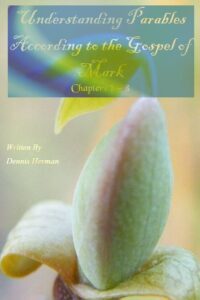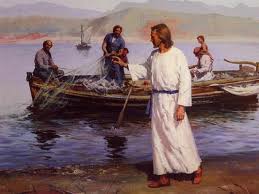Mark 4:1-20 Parable of the Sower
Mark 4:1-9 NLTse Once again Jesus began teaching by the lakeshore. A very large crowd soon gathered around him, so he got into a boat. Then he sat in the boat while all the people remained on the shore. (2) He taught them by telling many stories in the form of parables, such as this one: (3) “Listen! A farmer went out to plant some seed. (4) As he scattered it across his field, some of the seed fell on a footpath, and the birds came and ate it. (5) Other seed fell on shallow soil with underlying rock. The seed sprouted quickly because the soil was shallow. (6) But the plant soon wilted under the hot sun, and since it didn’t have deep roots, it died. (7) Other seed fell among thorns that grew up and choked out the tender plants so they produced no grain. (8) Still other seeds fell on fertile soil, and they sprouted, grew, and produced a crop that was thirty, sixty, and even a hundred times as much as had been planted!” (9) Then he said, “Anyone with ears to hear should listen and understand.”

The disciples began to see a pattern forming. Every time Jesus was near water, or an open field a crowd would gather. As a matter of fact this happened in homes also. It seemed no matter where Jesus was, it did not take long for word to get around.
As the crowd grew Jesus stepped into a boat. James and John cast it out a little further into the water, each holding an anchor rope. As crowds gather around they welcomed the cool breeze coming off the water. It created tiny waves that rocked the boat at first. James and John walked out a little further, one at the front, the other at the back of the boat. When they pulled on the ropes it steadied the boat, making it easier for Jesus to walk up and down to add animation to His lesson without rocking.
“Listen! A farmer went out to plant some seed. As he scattered it across his field, some of the seed fell on a footpath, and the birds came and ate it.” James wondered why Jesus would tell a story about a farmer while he was in a boat. Wouldn’t it be better if He told a story about fishing? Peter thought about helping his mother in the garden as a boy. He remembered how he helped his mother work the ground, carefully planting the seeds in even rows, marking them with sticks. A smile came to Peter’s face as he thought about how his mother explained how water made the plants grow. As a young boy he would run out every morning to see if anything was growing, It seemed to take forever. Then one day he saw the first signs of life. Tiny green plants began poking up through the soil. Peter wanted to help them grow, so he ran back and forth from the lake with buckets of water. He thought if a little helped, more would be better. He was so proud of flooding the small garden he ran inside the house to call his mother. She came out, looked at the garden swimming in water. Kneeling down she gave Peter a hug. She then explained how the plants need air and sunlight as much as water. Peter felt so bad when many of the plants withered and died, but learned an important lesson about not only plants, but life.

We all seem to lead an unbalanced life in one way or another. It may be an imbalance of love and discipline, diet, time between work, pleasure and family, or our spiritual life. Too much water may kill off new believers, like too much doctrine, which blocks out Jesus and the love He gives us to share. Whatever the imbalance may be, Jesus can meet us where we are, offer suggestions, and if we are willing, reestablish the balance God created within us.
One of the farmers listening to Jesus thought how ridiculous His story was. Why would anyone be so careless as to scatter precious seed on the road? He thought about how carefully he plows his rows and watches over the hired help and family to ensure they drop the proper amount of seeds with the proper spacing along each row. There is nothing careless about farming, not if you want to make money. Nothing should be left to chance.
How many of us have seen the same frame of mind in churches? Jesus gives us a parable telling us to freely cast His seed, God’s Word. Jesus tells us He knows some seed will never sprout because it appears to land on hopeless hearts. Although we receive instructions which make little worldly sense, some church leaders want follow their own plans, hoarding all the seed, storing it in barns until the judgment day. How do they hold back God’s Word? By not exploring the messages and lessons given to them as a gift from the Spirit. Some church leaders feel only qualified members should be allowed to study, interpret and share God’s Word, His seed. In effect they are telling other members to hold onto their seed, don’t spread it out. Why? Are they afraid of attracting members who may not fit their concept of the perfect church? Or are they afraid a member may spread a seed that is not in line with their perfect doctrine? In either case, they are not following the instructions of the teacher crazy enough to tell a parable about a farmer from a boat.
Watching Jesus reminded the farmer of his reliance on God. If God didn’t bring the sun and rain, there wouldn’t be any new seed at all. So what is the farmer in Jesus’ story wasting? The seed he has been freely giving as a gift from God.
Other people watched sea gulls running up and down the shore, darting through the sky, occasionally diving into the water. They knew gulls eat anything and everything. If they could they would steal a meal out of your mouth. They were known as winged beggars, scavengers.
Jesus continued. “Other seed fell on shallow soil with underlying rock. The seed sprouted quickly because the soil was shallow. But the plant soon wilted under the hot sun, and since it didn’t have deep roots, it died.
James related the shallow soil to shallow waters. They could fish shallow water where they may catch more, but smaller fish. Deep water required more planning, patients, and wisdom. Shallow waters were also safer and took less time to reach. James laughed to himself. Shallow water was really for children.
The same is true when we spread God’s Word. When we are weak in our faith spending little time in His Word and less time with His Spirit, we fish shallow waters, intentionally casting our seed on shallow soil. Do we ever consider turning up the ground in our own hearts? Do we search deep for God’s message, challenging God when we study His Word? Or do we take the easy way out, expecting others to pray, study, talk to God for us, and wait for a brief summary? How much of God’s Word are we able to share when all we receive is a short summary? Are we able to share from a deep, close, personal relationship with God, or do we feel sharing a few seeds in shallow soil is our direction and calling from God?
After bending over the side of the boat, dipping His arm in as far as it would reach and scooping out handful after handful of water to illustrate deep soil, Jesus stood up, smiled and shared His favorite part of the parable. “Still other seeds fell on fertile soil, and they sprouted, grew, and produced a crop that was thirty, sixty, and even a hundred times as much as had been planted!”
Jesus knows we are all different. We aren’t all going to spread the same amount of seeds, but we are all going to be given some seeds to spread. If we choose to hang into them and carry them around, do we notice the load? Jesus also taught about a load. “Come to me, all of you who are weary and carry heavy burdens, and I will give you rest. Take my yoke upon you. Let me teach you, because I am humble and gentle at heart, and you will find rest for your souls. For my yoke is easy to bear, and the burden I give you is light.” (Matthew 11:28-30 NLTse). Does this light load have anything to do with spreading the seeds, delivering the messages Jesus gives us to share? Do we make our own load heavy by hoarding the seeds we are given to spread?
Jesus finished His story adding a word of advise to those paying attention. “Anyone with ears to hear should listen and understand.” This made everyone, especially His disciples think back on what he said. They began looking around. What do the birds represent, the road, the ground and seed? It suddenly dawned on them, Jesus told the story because it had a much deeper spiritual meaning.
Mark 4:10-20 NLTse Later, when Jesus was alone with the twelve disciples and with the others who were gathered around, they asked him what the parables meant. (11) He replied, “You are permitted to understand the secret of the Kingdom of God. But I use parables for everything I say to outsiders, (12) so that the Scriptures might be fulfilled: ‘When they see what I do, they will learn nothing. When they hear what I say, they will not understand. Otherwise, they will turn to me and be forgiven.'” (13) Then Jesus said to them, “If you can’t understand the meaning of this parable, how will you understand all the other parables? (14) The farmer plants seed by taking God’s word to others. (15) The seed that fell on the footpath represents those who hear the message, only to have Satan come at once and take it away. (16) The seed on the rocky soil represents those who hear the message and immediately receive it with joy. (17) But since they don’t have deep roots, they don’t last long. They fall away as soon as they have problems or are persecuted for believing God’s word. (18) The seed that fell among the thorns represents others who hear God’s word, (19) but all too quickly the message is crowded out by the worries of this life, the lure of wealth, and the desire for other things, so no fruit is produced. (20) And the seed that fell on good soil represents those who hear and accept God’s word and produce a harvest of thirty, sixty, or even a hundred times as much as had been planted!”
The disciples recounted details of the day sitting around a fire after dinner. It didn’t take long for them to begin questioning one another on Jesus’ parable about the sower with seed. Each of the disciples tried to outwit the others, fashioning their questions so they would not let on to the fact they did not know the answers. It soon became evident, no one knew the answers. So they asked Jesus what the parable meant. By the smile on Jesus’ face they could tell He was waiting for them to ask. He replied, “You are permitted to understand the secret of the Kingdom of God. But I use parables for everything I say to outsiders, so that the Scriptures might be fulfilled: ‘When they see what I do, they will learn nothing. When they hear what I say, they will not understand. Otherwise, they will turn to me and be forgiven.'” They knew it was important when Jesus quoted scripture. Now they were listening. Jesus waited until He knew every eye was on Him, every heart was open. Then Jesus said to them, “If you can’t understand the meaning of this parable, how will you understand all the other parables?”
This is an important message for us. How do we understand the meaning of this parable? In one chapter Mark records the parable and provides the answer. When we look at the four gospels we find only a handful of parables Jesus explained. Why did Jesus explain only a few parables and not others? Is there a deeper message we see when we understand the reason?
The disciples wanted to understand all of Jesus’ parables. According to Jesus, He was about to reveal the key to understand all of them. They were excited as Jesus began to explain each detail. “The farmer plants seed by taking God’s word to others.” Each of the disciples knew they were being trained to take God’s Word to others. They hoped to one day become a teacher like Jesus, to have crowds follow them, to look at scripture and understand. They understood the meaning of the symbol, but still did not understand the lesson. Jesus continued, “The seed that fell on the footpath represents those who hear the message, only to have Satan come at once and take it away.”
They knew Ezekiel and Daniel used birds to represent people, but never heard of birds representing Satan. Maybe it was the control he had over them. After all, not many people are possessed by demons, but a lot of people break God’s law, make life more difficult for others, inflict unnecessary pain and trials, all acting the part of Satan’s agents. Now the disciples were beginning to think they are finally able to understand. People are used by Satan to snatch the seeds away.
Jesus gave them a minute to think about and absorb what they learned so far. He wanted His words to sink in deep. He also know they needed a few moments with the Spirit, so He could explain the details when their heart was open to understanding. When He knew they were ready He added more. “The seed on the rocky soil represents those who hear the message and immediately receive it with joy. But since they don’t have deep roots, they don’t last long. They fall away as soon as they have problems or are persecuted for believing God’s word.”
They all knew plants would not grow in stony soil. Now they understood why Jesus used it as a symbol. They once again began to think about scriptures describing stones. And I will give you a new heart, and I will put a new spirit in you. I will take out your stony, stubborn heart and give you a tender, responsive heart. (Ezekiel 36:26 NLTse). They also saw the pattern developing. The hidden meaning of the symbols Jesus used can be found in the scriptures. It seemed simple enough. No wonder Jesus began His explanation by quoting scripture. It was a hint. More than a hint, a guide!
Once they understood the symbol stony ground was explained by scripture, they could see Jesus was referring to a stony heart. Throughout the parable Jesus was referring to the effect God’s Word has on the heart. This explained why some people understood, while others didn’t. They realized there were two ingredients to understand Jesus’ parables, an open heart, and the scriptures.
Stony ground describes the condition of this world. “They fall away as soon as they have problems or are persecuted for believing God’s word.” Satan does his best to distract everyone trying to accept and understand God’s Word. It is something we need to learn to overcome in our own lives. It is part of the personal relationship we have with God. We decide if we are going to make the time or not. Then there are the distractions in the form of trials testing our faith. Some times when people see a new faith, a new enthusiasm in you, they want you to tone it down, or begin to avoid you. Persecution happens in the church. Many people are afraid to share what they have learned. They may have seen others ridiculed when they come to church ready to share something new they saw while studying at home. Some times leaders discourage personal study and growth in the Spirit. They may be afraid of questions they are unable to answer. They may be afraid of members with a higher understanding then what they have been able to achieve. Then there is the fear of someone questioning their doctrines.
Jesus could tell by the smiles on their faces the Spirit was working on their hearts and they were beginning to understand. Jesus knew it was time to share the meaning of good soil. “And the seed that fell on good soil represents those who hear and accept God’s word and produce a harvest of thirty, sixty, or even a hundred times as much as had been planted!”
When the disciples heard this they wondered exactly what Jesus meant by accept God’s Word. This would mean the other soils, those on the road and with stony hearts did not accept God’s Word. Did Jesus mean they did not accept the parables He taught, scripture which explained the symbols, or everything? Can people accept one part but not the other? What did they have to do to accept God’s Word? Was Jesus willing to teach them everything they needed to know? They knew their goal was to bring more people to Jesus, to help teach God’s Word. Now they knew they had to keep their hearts and minds open, concentrate on Jesus’ parables, and compare them with scripture to be able to learn and share the spiritual meaning of the symbols He used.
